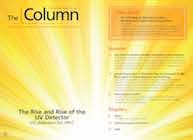Event Preview: SCM-9
The 9th SCM symposia (SCM-9) will take place from 30 January to 1 February 2019, in Amsterdam, The Netherlands. Focusing on the separation and characterization of natural and synthetic macromolecules, SCM is the place where academia is challenged by industry to help solve real problems using analytical tools.
sborisov/stock.adobe.com

The 9th SCM symposia (SCM-9) will take place from 30 January to 1 February 2019, in Amsterdam, The Netherlands. Focusing on the separation and characterization of natural and synthetic macromolecules, SCM is the place where academia (represented by the International Scientific Committee) is challenged by industry (represented by an Industrial Advisory Board) to help solve real problems using analytical tools.
Many different classes of highâmolecular-weight analytes will be discussed, with synthetic polymers receiving a great deal of attention. Similarly the analytical challenges posed by natural polymers, such as polysaccharides, will feature, forming a bridge to biopolymers, including proteins. For all these polymers, liquid chromatography (LC), field-flow fractionation (FFF), and light-scattering (LS) are important characterization methods. Special methods, such as hydrodynamic chromatography and comprehensive two-dimensional liquid chromatography (2D-LC), will be discussed in detail. There will be ample attention for recent developments in mass spectrometry (MS) and ion-mobility spectrometry (IMS) and in nuclear magnetic resonance (NMR) spectroscopy.
SCM-9 features 78 exciting lectures in various formats, including invited keynotes, state-of-the-art overviews, and tutorials by leading specialists. The other half are submitted oral presentations, mainly from young scientists. The leading suppliers of instruments and consumables will be present at SCM-9 to demonstrate and discuss their latest innovations. Abstracts for poster presentations can still be submitted. All posters will be on display throughout the meeting to maximize scientific interaction. A special session will be devoted to synergies between poster presentations and the exhibition.
For anyone who wants to learn more about the key separation techniques, two one-day short courses will be organized prior to the meeting. On Monday 28 January 2019, Kim Williams (Colorado School of Mines, Colorado, USA) and Myeong Hee Moon (Yonsei University, Korea) will discuss all the ins and outs of FFF, a technique that has seen considerable growth in recent years. Different FFF techniques (flowâFFF, sedimentation FFF, thermal FFF) will be discussed, with special emphasis on case studies, method development, and troubleshooting. On Tuesday 29 January, Taihyun Chang (Pohang University, Korea) and Harald Pasch (Stellenbosch, South Africa) will share their immense knowledge on polymer separations with course participants. Size-exclusion chromatography (SEC) and various modes of interaction LC will be explained, culminating in 2D separations. Applications to various types of polymers will be discussed.
SCM-9 is the ideal platform for industrial scientists to catch up with the latest developments in the field and to meet the most exciting new talents; for academic researchers to meet each other, share ideas, and results; for students to discuss their work with academic and industrial experts; and for instrumentation experts
to meet hundreds of scientists and to make connections between their own innovations and the latest scientific developments.
There are plenty of opportunities for young scientists, including oral presentations, posters, and poster pitches. They compete for several awards, including the best poster award and the SCM award. Based on the abstracts submitted for oral presentation, the SCM Committees have selected Jessica Desport from the Luxembourg Institute of Science and Technology in Belvaux (Luxembourg) to present the Young Scientist Award Lecture in the opening plenary session. Jessica’s subject, “Taming the mass spectrometry of high-molar-mass polydisperse polymer blends”, very much fits in with the main themes of the conference.
There will also be an exciting social programme culminating in a conference party in true SCM style.
E-mail:info@scm-9.nlWebsite:www.scm-9.nl

Polysorbate Quantification and Degradation Analysis via LC and Charged Aerosol Detection
April 9th 2025Scientists from ThermoFisher Scientific published a review article in the Journal of Chromatography A that provided an overview of HPLC analysis using charged aerosol detection can help with polysorbate quantification.
Analyzing Vitamin K1 Levels in Vegetables Eaten by Warfarin Patients Using HPLC UV–vis
April 9th 2025Research conducted by the Universitas Padjadjaran (Sumedang, Indonesia) focused on the measurement of vitamin K1 in various vegetables (specifically lettuce, cabbage, napa cabbage, and spinach) that were ingested by patients using warfarin. High performance liquid chromatography (HPLC) equipped with an ultraviolet detector set at 245 nm was used as the analytical technique.
Removing Double-Stranded RNA Impurities Using Chromatography
April 8th 2025Researchers from Agency for Science, Technology and Research in Singapore recently published a review article exploring how chromatography can be used to remove double-stranded RNA impurities during mRNA therapeutics production.









